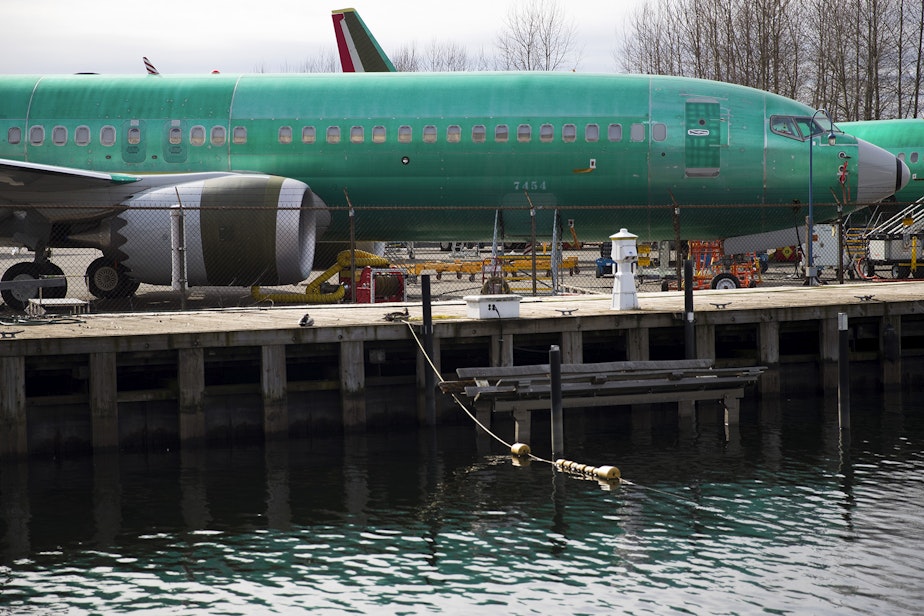How the history of Boeing’s 737 led to its current crisis

Boeing is cutting back the production rate of its 737 Max jet. It's a sign Boeing is preparing for a long battle to end the grounding of the plane.
The plane that became the world’s most popular aircraft started out in 1964. It would become the most produced plane, with more than 10,000 deliveries and the most profitable plane in Boeing's history.
But now Boeing’s irreplaceable 737 is at the center of a crisis that has engulfed the company, its regulator, and the world’s trust in air travel. The story of the 737's current problems, however, can be traced to its origins in '60s travel.
“It was called The Flying football because it had these little short stubby wings and a kind of a short stubby fuselage,” said Jon Ostrower, editor in chief of The Air Current. “And it was designed for you know missions of 500 miles maybe a thousand tops.”
It was a plane for the skies of the '60s and' 70s, for small airports with no frills. Boeing's production line popped them out like Toyotas.
And over the decades, the company stuck with its winner. The 737 got longer as it provided seats for more passengers. Its capabilities grew and it began to cross oceans. But it was still the same plane.
Sponsored
“What essentially Boeing did was they was they grafted on areas of automation on this original design,” Ostrower said. “And as they evolved it over decades it was you know a change here a change there a change here a change there.”
Many of those changes were driven by competition. In the 1970s Airbus came up with the A320, and in the 1980s Boeing lost a big Northwest Airlines order to that plane.
Ostrower said in the late 1980s, Boeing considered an all-new advanced technology plane to replace the 737. But so much money and effort — was it necessary?
“And guess what happened?” Ostrower said. “They decided against it. And what did we end up getting was the 737 Next Generation. “
Then in 2010 Airbus put fuel-efficient engines on the A320. Suddenly, a big American Airlines order was in danger.
Sponsored
“Here we are in 2011 and Boeing is having to launch the 737 Max,” Ostrower said. “So Boeing again has to you know find a way to put bigger engines on the airplane and figure out how to stretch the design one more time.”
Airbus didn't just bring planes to its competition with Boeing. It brought a whole philosophy that airlines found compelling. No matter what size of Airbus, they all had the same flying feel.
“Airbus wanted to have an airplane with characteristics throughout the family,” said Michel Merluzeau, director of market analysis and strategy at AIR. "Common cockpits and a proximity in terms of how the aircraft flies itself.”
Airlines learned common cockpits meant pilots needed less training. Boeing learned that it needed to do the same to attract and keep orders.
Which bring us to Boeing's development of the MCAS automated system for the 737 MAX. The acting head of the FAA told a congressional committee last week that the MAX was certified as a 737 because the MCAS automated system made it fly like a 737, and fast-tracked through the certification process.
Sponsored
"We gave it an amended type certificate, because of the way it aided the pilots in the feel and fly of the airplane," Daniel Elwell said.
This was Boeing pushing a 1960s plane into the 2020s instead of investing in a new plane.
“And the only solution you got now is to you know put LEAP X engines on the 737 and hope that meets the requirement of the customer and that's what they did,” Merluzeau said. “Bad product strategy I think, personally.”
“737 is an absolutely essential aircraft not just for Boeing but for the global economy," Merluzeau said. "If you take the 737 out of that global transportation system, Airbus is not able for a number of years provide a replacement solution.”
Investigations are underway into MAX's design and certification processes – including a criminal investigation.
Sponsored
"We'll do everything possible to earn and re-earn that trust and confidence from our customers and the flying public in the weeks and months ahead," Boeing CEO Dennis Muilenburg said in a Friday statement.
But Boeing's not fully in control. Jon Ostrower said his sources tell him: “We don't yet know how this one plays out. This has opened Pandora's box and it's a mess.”
And it may be just beginning.



